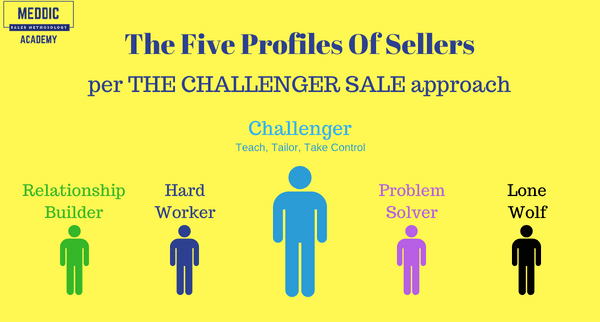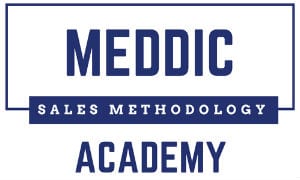What is The Challenger Sale?
The Challenger Sale is a great concept. It is described in a book with that name , brilliantly authored by Matthew Dixon and Brent Adamson. Before reading their book and being exposed to the concept, as a long time sales leader, I always considered that the best sales reps are those who appear smarter than the client; those who are able to take control of the sales calls through smart and relevant questions during the discovery phase, making the prospect want to listen to them and to their vision and ultimately to their solution. When I read the book I liked how the authors articulated and formalized my perception through years of sales management. For those of you who are not familiar with the book, I highly recommend you to read it but here’s the 5 lines elevator pitch:
The concept’s genesis is a study on Enterprise Sales people which shows that successful sellers apply the Challenger Model and are thus categorized as a type of seller; those who lead the conversation with the prospect (and ultimately the sales process), thanks to a strong understanding of the client’s business and their innovative perspectives of the client’s challenges. They teach, tailor and take control. Advocates of the Challenger Sale concept correlate successful sellers’ performance with their Challenger Sale approach.
Is The Challenger Sale a Sales Methodology?
I am a firm believer in the Challenger Sale approach, in the sense that successful sellers take control of the sales process, influence decision criteria, and lead the conversation. But let me be contrarian for a few minutes and challenge it as a sales methodology:
- To begin, the categories in the study leading to the Challenger Sale approach should not be considered as exclusive: You can be a Challenger seller AND a Lone Wolf or a Hard Worker. You can (and you should) keep your style (“be yourself since everyone else is taken” right?), and learn how to control the sales process and influence the client. Of course in the book the profile of the sales reps is not just about the title, but there is still a huge overlap.
- Although I am a strong advocate of the concept, I am not considering it as a standalone methodology that you can easily and quickly implement in any sales force.
- The Challenger Sale requires the Account Executive to know the industry’s problems and different ways to solve those problems. If your Sales Force is very young or your hiring strategy is about bringing in sharp aggressive hunters from outside your industry, either because you are in an old conservative industry or for any other reason, then it will take forever to train the sales team to this model. Instead, you would want to integrate consultants in the sale team to complement the pure sales approach with the challenger sale approach. The consultants or senior sales engineers can help. At PTC, I multiplied my numbers by 7 in 3 years, by hiring young sellers only from outside the CAD/PLM market, and that despite a traditionally conservative target clients (Mechanical and Industrial Engineers in Manufacturing). If I had focused on this approach with new hires, we would have failed.
- Training a sales force to the Challenger Sale model is long and expensive. If your sales force is composed of senior sales people from the industry, they will need to unlearn their existing practices. If they are young and new to the industry, they first need to learn the fundamental challenges and the trends of the industry before being credible in front of the client. In both cases it takes time and costs a lot.
- Although The Challenger Sale is the winning approach, considering it as a “Sales Methodology” to “teach” to newly hired sales people is yet to be proven. Many organizations have started looking at the challenger sale as a methodology only in the past few years. We’ll only have proof of the efficiency of this methodology on a consistent and sustainable way, only in 5 or 10 years.
Again don’t get me wrong, the approach is brilliant. But the practical implementation of the approach as a methodology is challenging, long, expensive and not for every sales force in the Enterprise Sales world.
You may want to check this related article comparing MEDDIC to The Challenger Sale.
I would love to read your comments below.
Darius Lahoutifard

